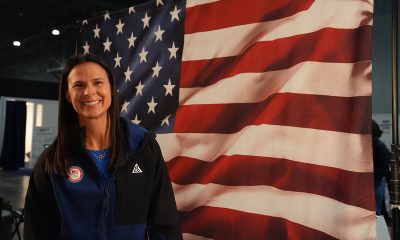a&e features
Adam Rippon on new life, loves, memoir, ass and skating in the nude
Rippon says Ashley Wagner abuse allegations, Coughlin suicide rocked skating world
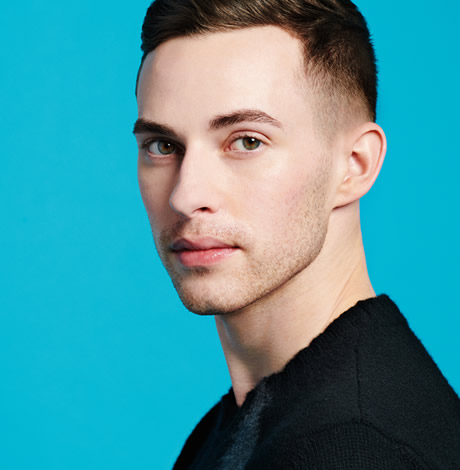
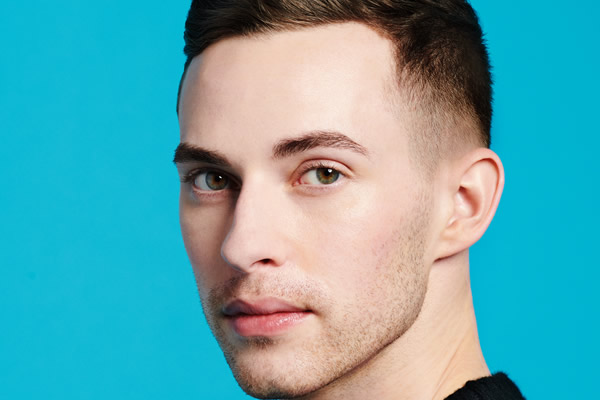
Adam Rippon says the time was right for his new memoir, ‘Beautiful on the Outside.’ (Photo by Peter Yang; courtesy Grand Central Publishing)
Adam Rippon
‘Beautiful on the
Outside’ book signing
Wednesday, Oct. 23
6 p.m.
Book Soup
8818 Sunset Blvd.
West Hollywood
$28 (includes book)
We blitzed through a torrent of questions with Adam Rippon by phone last week. The bronze medal-winning gay breakout star (and self-proclaimed “America’s sweetheart”) releases his memoir “Beautiful on the Outside” Oct. 15. He and skier pal Gus Kenworthy each came out in 2015 and last year became the first openly gay male U.S. athletes to compete at the Winter Olympics. Rippon is in LA (at Book Soup) on Wednesday, Oct. 23 as part of a 13-city book tour. His comments have been slightly edited for syntax and length.
WASHINGTON BLADE: How did the book come about?
ADAM RIPPON: Well, right after the Olympics, my team was saying that it might be a fun idea to write a book and I thought that this, like, really felt like a full chapter of my life sort of coming to an end and a new one was starting so I felt like it would be a really therapeutic almost experience. And I thought it would be a good thing for me to do, to kind of debrief and sort of be my moment to soak in everything that was like going on. So it was my team’s idea but then ultimately it was something that I did truly want to pursue.
BLADE: How long did it take to write?
RIPPON: About six-seven months. It wasn’t too long but it was a substantial amount of time.
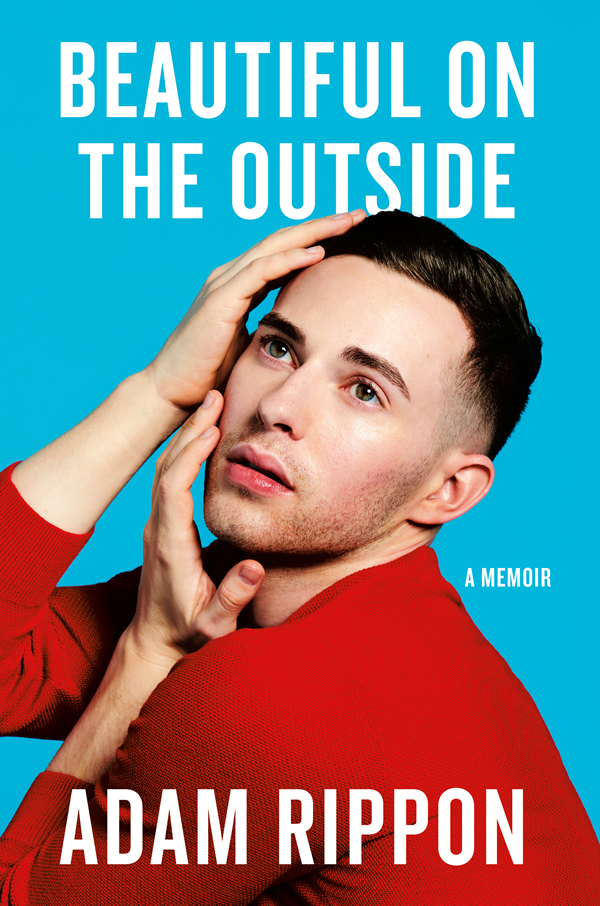 BLADE: A lot of your appeal is the way you come across on camera. Were you concerned that that might not translate to the written page?
BLADE: A lot of your appeal is the way you come across on camera. Were you concerned that that might not translate to the written page?
RIPPON: Totally. One thing that I really focused on was (making sure) the writing felt very in person, so that whatever you were reading felt like I could have been sitting right next to you like on a couch telling you this story and you were hearing my voice. So that was really important to me because I feel less like a writer and more like a storyteller. So I wanted to make sure, especially when I would be doing the audiobook, that it really felt like I wasn’t adding any words or saying any words that I wouldn’t say in a conversation.
BLADE: You share a lot of hard-won wisdom in the book. Were those convictions about life already in your head and bones or did the process of writing the book kind of help you distill and articulate some of that?
RIPPON: I think when I wrote the book, that was such an important thing for me to add into it because those are lessons and scenarios and things that I had learned and they were just so important to me, that was something really I wanted to add into the story. … Sometimes I just laugh at myself and move along through life through different struggles and things of that nature, but I really did learn a lot about myself, it really prepared me for the bigger moments.
BLADE: A lot of the book is about how what was going on in your head affected your skating. Did you ever work with a sports psychologist when you were competing?
RIPPON: I did but … it’s funny now, post skating career, I see a therapist but when I was skating, I felt like, no that’s weak, I’m not going to go to a sports psychologist, I’m going to just suck it up. I wish I had, but it’s harder because when you’re a competitive athlete. One you don’t have a lot of means to go out and find someone on your own and they do offer someone but it’s like someone that everybody uses, like all of your competitors are going to use the same sports psychologist, so in a way I was like, “Am I really going to tell my deepest fears with somebody’s who’s then gonna work with all of my competitors too?” I was like, no, I’m gonna tell this bitch that yeah, everything’s fine and I’ve never felt better. So it’s hard but now as an adult, I can go out and find someone on my own who’s personally mine and that was just something I did not have access to when I was competing because it was really expensive.
BLADE: How often are you on the ice these days?
RIPPON: Maybe once or twice a month now. Just skating for myself. Sometimes if I have a day off, I’ll go work with one of the skaters I used to train with, Mariah Bell. Working with her some makes me feel connected to skating, but I don’t skate very much on my own anymore.
BLADE: Would you like to do more skating exhibition tours?
RIPPON: I would, but they take so much time and energy to prepare for and I would not ever want to do one and not feel like I was giving my best. … Right now I really do want to focus on pursuing these other endeavors that are available to me now and I do want to pursue them because I do think the time to do that is right now and if there is something comes up in skating, it’ll make sense. Right now, I think I’m really focused on writing this book and that kind of hustle.
BLADE: It looks like you’ve stayed in great shape. Do you feel pressure to have perfect abs? I mean the shape you were in for Olympics has to be impossible to maintain I imagine.
RIPPON: Well, you know what? I’m gonna be super honest. After the Olympics, I went to the gym and I was like, “I can’t do this anymore. I’ve gone here every day of my life for 20 years and I just don’t have the motivation,” and that was OK. But I didn’t go to the gym for maybe a year.
BLADE: Oh wow.
RIPPON: Yeah, I know. It was a lot.
BLADE: But you didn’t gain 300 pounds or anything. I haven’t seen you lately but you look like you were in great shape on “Dancing With the Stars.”
RIPPON: I’m not 300 pounds yet, but no. … I realized I just needed to find new goals at the gym because it’s something I really enjoy. So I’ve been going for like the past month and have been working out pretty regularly with my old trainer again and, of course, the workouts are totally different, because it’s no longer about trying to be as good a skater as possible. But I really love the rush you get from finishing a workout.
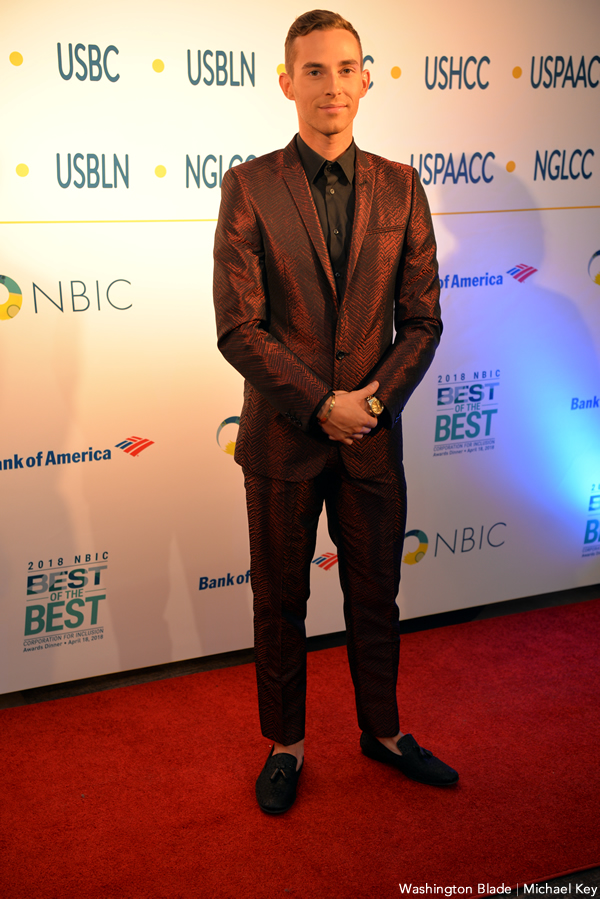
Adam Rippon (Washington Blade file photo by Michael Key)
BLADE: You make a joke in the book about your hook-ups not believing you had an office job because nobody with a desk job would have an ass like yours. What kind of currency has having that kind of butt given you in your personal life? Is it something your boyfriends have gone on and on about or it something that maybe seems more exaggerated from afar? Tell me about your ass, Adam.
RIPPON: Well, here we go. How much time do you have? (laughs) No, I’m kidding. Um, the one thing I’ve noticed, now surrounding myself with people who are not athletes by profession is that everybody who works out and goes to the gym, the hardest thing for them is legs. I’ve noticed going back to the gym, that’s always been my upper hand because I’ve done only legs for so long. With my boyfriend, he’s mostly envious that I have these bigger legs and, like, a butt that really fills out my pants. Mostly he’s jealous but he does like it, which is good because I can’t really get rid of it.
BLADE: At one point in the book you say you were having trouble with quad toe so you had to switch to quad lutz. Why not quad sal?
RIPPON: It’s a little different with the quads. That’s why you see these Russian junior girls and some of them won’t do triple axels but their only two quads are toe and lutz. The lutz may be the hardest because that entrance is so hard but when you have the torque just right, it really snaps the quickest into rotation. I think when you’re learning triples, the skill of how you should learn them is correct, but with quads, it’s more like which do you feel and I think difficulty sort of comes in second.
BLADE: Did you ever play around with quad loops or flips?
RIPPON: Yeah. I think in my life, I’ve landed a (quad) flip, a salchow. It was just one day and it’s going really well, then the next day I’m just doing like cheated triples and I’m like, “Oh, OK, here we go.”
BLADE: Have we hit the ceiling on quads? Is it realistic to think somebody might land a quad axel someday?
RIPPON: I think so. I never thought I’d see a day where somebody has a program like Nathan Chen’s planned programs and it’s something he actually does and it’s not, like, a joke. And it’s the way he does it really effortlessly and you don’t really actually notice he’s doing all these quads ‘cause they’re so well done, which is the scariest part of his skating.
BLADE: Have you stayed in touch with him?
RIPPON: I’ve stayed in touch with pretty much everyone I competed with and with Nathan, we had the same coach for a while. I have such a soft spot for him and the things that he does. I’m always cheering for him. He’s just a really, really good kid and, you know, works super hard and is so well rounded. I love catching up and seeing how he’s doing.
BLADE: I know it’s probably hard to put into words, but how much harder is the triple loop than the triple toe as the second jump in a combination?
RIPPON: Adding the triple loop onto something is much harder because the room for error and correction on landing the first jump is so small. When you’re doing a triple loop in a combination, the biggest thing is you cannot readjust or fix the landing position of that first jump because it happens so quickly and it immediately needs to come together. With the toe loop, you can readjust the tap into the ice, you can tap a little further, tap quicker, you can jump a little more from the assistance of the free leg, so it’s still incredibly difficult but a triple loop combination is by far much harder than a triple toe loop combination.
BLADE: Were you more team Zagitova or Medvedeva in the ladies’ event last Olympics?
RIPPON: You know, I think that I was really impressed with Zagitova, I thought she skated very well, but I do have to say the way that Medvedeva handled herself as like a two-time world champion, and then to go out and skate two clean programs, I just felt she had a lot of substance to her skating maybe her style wasn’t the I don’t know, wasn’t everybody’s cup of tea. She performed, she had everything that an Olympic champion should have and I really felt that she kind of earned it. Zagitova skated a little bit like a really excellent junior lady in her first year senior. It wasn’t as refined and Medvedeva was a two-time world champion heading into that event, she was very refined and in that moment and was incredibly young, but yet had some womanly flair to her, which I really admired. I completely see why Medvedeva was the silver medalist and Zagitova was the gold medalist, I understand, but if I were judging I would have had Medvedeva first.
BLADE: Did it bother you that Zagitova back-stacked all her jumps? (Jumps completed in the second half of the long program are weighted in scoring.)
RIPPON: No. I mean, of course I want to be like, yes, it doesn’t make for a nice program, but then at the end of the day, we have rules and we have points and you know I think if Eteri’s goal, their coach, is that she has a student who wins, and that they compete and there’s no pecking order of who should win and who shouldn’t win, you’re gonna go and you’re gonna do the most that you can do. So, I mean she played the game within the rules and she knew that Medvedeva had better style, so the way to make Zagitova more competitive against Medvedeva would be to just technically you know, put everything at the end. So is it annoying, like a little bit, but is she cheating? No. Everybody had that option and everybody knew that, so it doesn’t bother me. I kind of look at it like I don’t like it, but you’re smart.
BLADE: Why are they wrapping everybody up in those goddamn jackets now the second you step off the ice? They never used to do that.
RIPPON: It’s a sponsor thing. While you’re just sitting there in kiss and cry, they want the sponsor logo to be visible on TV. Obviously you couldn’t skate with a logo, but when you’re just sitting there waiting for scores, you can see what it says on the label.
BLADE: I wasn’t a big fan when they changed the rules to allow vocal music. You took advantage of it. What was your opinion?
RIPPON: I didn’t like it at first, but then I really enjoyed it as a skater. I just thought it opened the door for a lot of really cool ideas.
BLADE: How was Tonya Harding on “Dancing With the Stars?” Did you develop any camaraderie with her?
RIPPON: I wouldn’t say camaraderie, but she was super nice and she’s fun. She’s super funny, really personable. You know, I doubt Nancy (Kerrigan) would think that, but she’s super personable. I had no problem with her. She was nice.
BLADE: Did you admire her skating back in the day?
RIPPON: The first competition I ever watched was ’98, so I never grew up with her, but once I went back and started watching things, I’ll always remember that opening at 1991 nationals with the “Batman” theme and that mint green dress.
BLADE: Did you like the movie “I, Tonya”?
RIPPON: I mean Margot Robbie when she does press for the movie, she says it’s Tonya’s side of the story and I think she did a really good job of that. But I think even Margot would tell you that the truth probably lies in the middle.
BLADE: So many skaters — Brian Boitano, Jeffrey Buttle, Johnny Weir — came out after they stopped competing. I’m not asking for names, but are there still closeted skaters that you know of or is that era finally over?
RIPPON: I think we’re becoming past it and I really feel that like I hope that I had something to do with it, where people felt like it didn’t really matter and you could still be successful. But I do think that the pressures of someone like me and someone like Brian Boitano or Jeffrey Buttle are so different. I was never a favorite for a world title, there was no pressure like that. I was just trying to kind of make my world team and see if I, if someone’s having a bad day, could swoop in for a world medal. Or like at the Olympics, know that I could be a really good asset to the team event. So I knew that like the pressures for me were totally different, they were not the same as somebody trying to win a world title, I wasn’t going to be as scrutinized. I mean especially compared to somebody like Brian Boitano in the ‘80s. So it’s a totally different time but I do think that because a lot of the attention, I did get at the Olympics, I think it broke down a lot of stigma. Because yes, there was a gay athlete but everything else wasn’t about that, which I think was great. I think it was a really good thing.
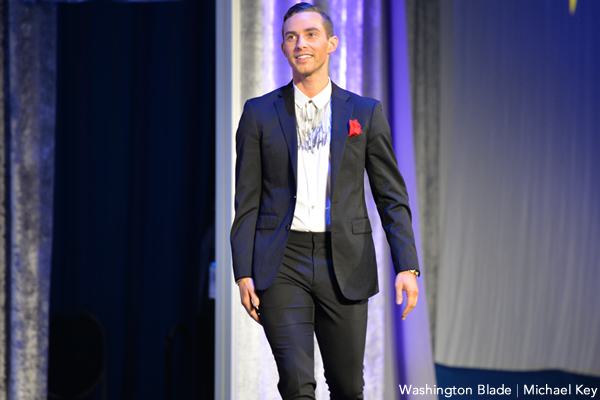
Adam Rippon at the 2018 Human Rights Campaign National Dinner. (Washington Blade photo by Michael Key)
BLADE: Why are there so many more medal opportunities in the summer games? Can you imagine if figure skaters had the number of medal opportunities as Michael Phelps?
RIPPON: I think when you get into subjective sports where it’s all based on human judging, it’s really hard to break those into different categories. And it’s part of the drama of skating that there aren’t all these opportunities. That’s one reason I love the idea of a team event, not only because I’m a medalist from it, but I love that it’s brought different stars from the Olympics forward. I mean look at Yulia Lipnitskaya from Sochi. In the team event, she was the star of the whole competition and when we think about the individual, I even forget that she competed in it. So it gives other people the chance to be Olympic stars in a different capacity. The whole point of the Olympics is to inspire people to get into sports. That really is truly what it is. And I think the team event really does that.
BLADE: You obviously came up long after compulsories were eliminated. When you go back and watch old performances, do you think skaters in the ‘70s and ‘80s had better form, better edges, because of having to learn the school figures or not so much?
RIPPON: I think the quality of skating is going up because the demands of what you have to do now technically are so high. You have to do so many transitions into jumps and so many turns and steps into all of your elements so you get a nice transition score and I think that’s pushing people to learn these turns and steps in the proper way and faster than if they’d started with figures. This way you jump right into it and the learning curve is a lot quicker. You know you have to do it this way because that’s how it’s judged so it’s the only way to be competitive.
BLADE: Were you really fully nude except for your boots for the ESPN shoot or did you have some kind of little loincloth on or something?
RIPPON: I was 100 percent naked and it was actually at the rink I trained at. There are three rinks and one is all the way at the end in the corner and they blocked it off and had security and everything but yeah, it was fully nude, and for the first two minutes it was like, “Isn’t it weird that I can see my dick and I’m skating,” but then you get going and you’re like it doesn’t really become a thing anymore and nobody’s really fazed by it because they’ve shot like a million naked athletes before so it’s a very cool experience.
BLADE: Isn’t it hard to skate with your dick flopping around?
RIPPON: No, because at that point, everything gets so small it’s like, “OK, this is what we’re dealing with.” It’s nothing to write home about. (laughs)
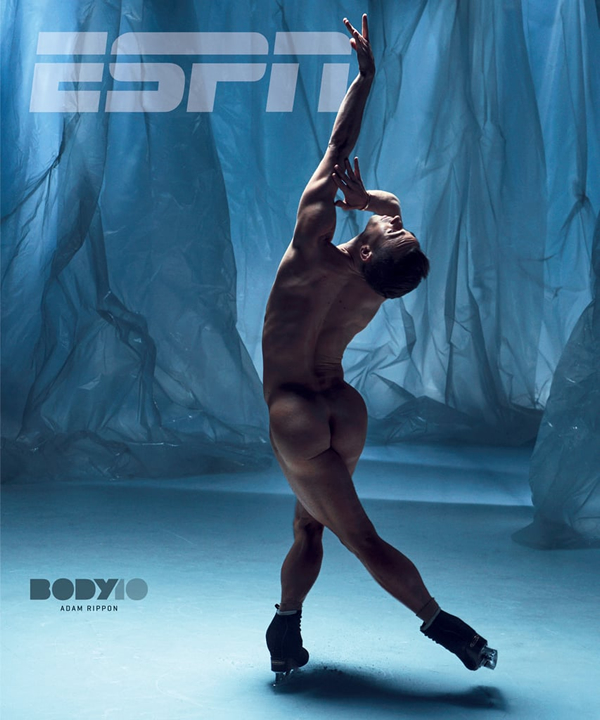
ESPN’s 2018 ‘Body Issue’ cover
BLADE: What did you think of Johnny Weir and Tara Lipinski’s commentary of your Olympic performances?
RIPPON: They bring such excitement to skating. People tune in to watch the skating, but also to hear their opinions. They’re like Dick Button and Peggy Fleming for this generation, where you wanted to hear if Dick Button thought you were a good skater or not. They aren’t mean, they’re honest and now, being able to be more subjective, I see that. I remember there was one performance where Johnny said he thought I wasn’t interpreting the music well and I was like, “What? He doesn’t know what he’s talking about.” But as I watch it back now, I’m like, “No, he’s totally right.” He was just giving an honest opinion and it’s his job do to that. … They add flair to the whole competition.
BLADE: Did you ever hear from Mike Pence after the Olympics or was that just a big dog-and-pony show?
RIPPON: Well I knew that I never would, so I haven’t.
BLADE: Do you keep the Mirror Ball Trophy (from “Dancing With the Stars”) with all your skating medals? Or they displayed?
RIPPON: All my skating medals are in a container from the Container Store. The Mirror Ball Trophy is in a guest bedroom on the night stand. I have it out if somebody wants to see it, but it’s not something I’m looking at all the time. I want to focus on getting more things and — I know this is just in my own head — but not feel complicit in what I’ve achieved so far.
BLADE: You don’t even keep your Olympic medal out?
RIPPON: They came in beautiful boxes so I have it in the box on a side table with the medal inside. So it’s there if somebody wants to see it but it’s not like, “Oh wow, it’s hanging on the wall.”
BLADE: Any hint of sexual tension between you and (out Olympic skier) Gus Kenworthy or is that just totally a gay bromance?
RIPPON: It’s very much a brotherly sort of relationship. I adore him. We don’t talk all the time, but he’s just somebody I think I’ll always be kind of close to.
BLADE: You say in the book you and (figure skater) Ashley Wagner were close friends. Do you have any comment on her decision in August to say she was sexually assaulted (11 years prior by pairs skater John Coughlin, who committed suicide in January under similar allegations)?
RIPPON: I think it was brave. I’m sure it was really hard for her to do it. I think it’s going to hopefully create some good conversations with people within the sport.
BLADE: You say in the book you two were super close. Did she tell you about this shortly after it happened? Did you know John Coughlin?
RIPPON: I did know John, I thought, pretty well. But I had no idea any of this was going on and it’s been pretty tough ‘cause I wish I could have said something to someone or said something to him, but I didn’t have that opportunity. It’s something I think a lot of skaters are struggling with because we don’t agree with it. It’s not good. So many athletes aren’t equipped to deal with the suicide of someone that they knew. So it was really something challenging for a lot of people to get through and it was just something that was still, you know, pretty raw I think for a lot of people.
BLADE: What did you think of Yuzuru Hanyu’s (gold-winning) performances in PyeongChang?
RIPPON: I thought he was amazing. He’s incredible. Such a legend.
BLADE: Is he approachable or kind of in his own world? What’s it like being around such a great skater?
RIPPON: There’s a level of respect for everybody like that that all the competitors have regardless of who they are or what they’ve achieved. He’s always been super nice and I would say that I enjoyed competing with him as both gold older. One thing that helped is since he moved to Canada, his English got better so we could actually chat. As an adult, I enjoyed seeing him and getting to cheer for him and watch him compete.
BLADE: How do you feel about turning 30 (in November)?
RIPPON: I can’t wait. I’m really excited.
BLADE: Why?
RIPPON: I just feel like it’s perfect timing. I’m retiring from skating and starting this new phase of my life and career so the time feels really good. And I don’t know, I felt like I was 30 for a few years already anyway, so it’s all good timing.
BLADE: Does (boyfriend) JP (Jussi-Pekka Kajaala) live with you now in L.A.? How are things there?
RIPPON: JP goes back and forth between L.A. and Finland. I’m actually going there Friday.
BLADE: How often do you get to see each other on average?
RIPPON: We probably spend about five months out of the year together.
BLADE: Are you and (“Dancing With the Stars” dancing partner) Jenna (Johnson) still BFFs?
RIPPON: Um, yeah. I love her. We talk, like, very often.
BLADE: Are you a morning person by nature or did you kind of just force yourself to be one all those years getting up to train?
RIPPON: I’m not, but if I don’t force myself to be a morning person, I could stay in bed for like years.
BLADE: What do you have coming up? What do the next six months look like for you?
RIPPON: I’m on the book tour for two weeks, then right after that I have a few stops and I’m working on a few other things that will be announced soon, which is cool. I also just filmed another series of Breaking the Ice, the little videos on YouTube. Yeah, just stuff like that. It’s all good, nothing super busy.
BLADE: What would you like to be doing in 10 years?
RIPPON: I would love to still be working in entertainment, in comedy, and be successful. Let’s see, I don’t know, I just would like to be really successful, have more awards, right? I’m an athlete, I love a good trophy. So I think I really enjoy the kind of stuff I’m doing now and just continue to be a performer but like in a different way. I’d love to still be doing all this in 10 years.
a&e features
35 years after ‘Truth or Dare,’ Slam is still dancing
Salim Gauwloos on Madonna, HIV, and why he almost didn’t audition for Blond Ambition Tour

Most gay men of a certain age remember “the kiss.”
It was the moment Madonna’s dancers Salim Gauwloos and Gabriel Trupin locked lips in the hit 1991 documentary film “Truth or Dare,” which is celebrating its 35th anniversary this spring.
The kiss was hot, but what made it groundbreaking is that it appeared in a mainstream Hollywood movie that screened in suburban multiplexes across the country. This wasn’t an obscure art house film. The movie, and tour on which it was based, received months of breathless media attention all over the world for bold expressions of female empowerment and queer visibility. Madonna was threatened with arrest in Toronto for simulating masturbation on stage and Pope John Paul II urged Catholics to boycott the show, triggering a media firestorm.
“Truth or Dare” was billed as a behind-the-scenes documentary of the tour, but it quickly became clear that the real star of the show wasn’t Madonna, but rather her colorful troupe of seven backup dancers, six of whom identified as gay: Kevin Stea, Carlton Wilborn, Luis Xtravaganza Camacho, Jose Gutierez Xtravaganza, Gauwloos, and Trupin; Oliver Crumes III identifies as straight.
We saw them party and march in the New York City Pride parade. They were unabashedly queer at a dangerous time — before protease inhibitors began to stem the AIDS plague and before most celebrities and politicians embraced the gay community in any real way. Being out in 1991 carried major risks to career and reputation.
Enter Gauwloos, one of those brave dancers who vogued his way into the hearts of countless gay men entranced by his handsome looks, his stage presence, and dance skills.
Gauwloos — known then and now as “Slam”— sat down with the Blade to talk Madonna, the lasting impact of “Truth or Dare,” the public disclosure of his HIV status, and plans for a new book on his life.
His story is fascinating — from growing up in Europe to dancing in New York to landing the gig of a lifetime with Madonna. He performed on that tour while secretly HIV positive and went without medical treatment for 10 years because he was living in the United States as an undocumented immigrant. Not even Madonna knew of his HIV status. Two other dancers on the tour were also HIV positive but no one talked about it. Ironically, Madonna was singing “Express Yourself” and advocating for condom use during her concerts yet backstage three of her dancers were secretly positive.
“A lot of people were dying so I wasn’t going to tell Madonna I had HIV,” said Slam, now 57. “And the others didn’t either. It wasn’t the moment to do it. She used to make speeches about Keith Haring and AIDS and I thought it’s going to be me next.”
Gabriel Trupin died of AIDS in 1995. Slam was diagnosed at age 18 in 1987, a frightening time when a positive test result often meant a death sentence. He booked the “Blond Ambition Tour” at age 21 after moving to New York. His friends encouraged him to audition but Slam resisted because he wasn’t a big Madonna fan.
“It was crazy, everyone wanted that job,” he said, “but I wanted to dance with Janet Jackson and Paula Abdul.” He listened to his friends and shortly after the audition, Slam received a call from Madonna herself inviting him to join the tour.
“We all wanted to be stars but not even Madonna knew how big that tour would become. The way it was choreographed and directed, the stars aligned. … It never looks dated even today.”

The world tour kicked off in Japan in April 1990 then moved to the United States and Europe, stirring controversy wherever it went. There was the iconic cone bra; the aforementioned simulated masturbation during “Like a Virgin”; and religious imagery that offended many Catholic groups and the Vatican.
And the controversy didn’t end with the tour. Cameras were rolling throughout the tour for what Slam thought would be a “video memory” for Madonna. But as the tour unfolded, director Alek Keshishian reportedly became more interested in what was happening behind the scenes so plans for mere tour footage were expanded into a full documentary.
“We were young and partying and didn’t really know what was going on,” Slam said. “You live in this celebrity bubble and you sign a paper – I don’t even know what I signed.”
In 1992, Kevin, Oliver, and Gabriel sued Madonna for invasion of privacy and fraud claiming she used some footage without their consent. They claim they were told nothing would be included in the film that they didn’t want to be seen. In one specific incident, Gabriel alleged that he told producers he didn’t want the scene of him kissing Slam to be in the film as he wasn’t fully out.
“Gabriel was forcibly outed,” in the movie, Kevin said in a 2016 interview.
Slam did not join his colleagues in the lawsuit.
“I couldn’t sue because I was illegal but I wasn’t ever going to sue,” Slam said. “I’m not a suing kind of person. But good for them, they fought for it and won. A lot of people don’t have the balls to sue Madonna.” The suit was settled two years later for an undisclosed sum.
“We were all conflicted about the kiss,” he said with a laugh. “The kiss, oh my God, my boyfriend is going to kill me! Belgian stress!”
Beyond worrying about his boyfriend’s reaction, Slam had concerns about the impact of being openly gay on his modeling career.
“In 1990, you couldn’t get high fashion campaigns as an openly gay model,” he said. “I was worried about that. I couldn’t get a campaign because I was gay. My agency told me to say I was straight and it was just a game.”
In 2016, pegged to the 25th anniversary of “Truth or Dare,” the surviving six dancers filmed a documentary about their lives post-Madonna titled “Strike A Pose.” In it, Slam publicly revealed his HIV status for the first time in an emotional scene with his former colleagues.
“I found the strength to tell the world I have HIV,” he recalls. “I was scared but I felt brave. The outcome and messages were beautiful. After I saw ‘Strike A Pose,’ I knew we gave people hope. And not just for gay people.”
He was infected in 1987 but didn’t get treated until 1997. After the tour ended, he said he went into a depression and his agency dropped him.
“I was partying too much after the tour,” he recalls. “I made a decision to live as an illegal alien.” In 1997, Slam collapsed and was rushed to the hospital with pneumonia.
“They started treating me and thank God the new HIV drugs were out, the cocktails, it took me a couple months to get better.”
Madonna didn’t participate in “Strike A Pose” and Slam said he hasn’t seen or spoken to her since the end of the tour. He said he had no idea of the impact “Truth or Dare” would have.
“You look at this movie in 1991 and you don’t think it’s going to be such a big thing and 35 years later it’s still helping people,” he said. “It was helpful for people who felt alone at that time. It was such an important documentary.
“I don’t think younger gay people realize how important Madonna was to gay and queer visibility — she was a big part of it. We showed the world it’s OK to be gay and that was the great message of this movie.”
He noted that, decades later, many of his friends have transgender kids and that queer culture is represented in much of mainstream pop culture.
“It’s amazing how far we’ve come,” he said. “I know we’ll always be marginalized but we have come so far. I’m really proud of our community. The current nightmare will be over and I do believe that things will get better.”
Referencing President Trump’s attacks on the LGBTQ community and crackdown on immigration, Slam described the situation in the U.S. today as “sad.”
“Everything is such a mess,” he said. “Some of these people have lived here 30-40 years and they take you out of your home. I can’t even imagine. It breaks my heart. When I was illegal it was a different story.”
Slam met his husband, Facundo Gabba, who’s from Argentina, in 2000, and he helped him get a legal case together to win citizenship. He filed a case in 2001 and was told there was a 99 percent chance he wouldn’t be permitted to stay in the United States because they weren’t allowing HIV-positive immigrants to remain in the country. But he got his green card anyway in 2005 and became a U.S. citizen in 2012.
Today, Slam and Gabba live in Brooklyn, though they travel a lot because “I can’t take the cold.” The couple married in Argentina in 2010 and in the U.S. in 2016.
Slam is still dancing and working as a choreographer. He’s teaching at a contemporary dance festival in Vienna in July and even offers online lessons via Salimdans.com.
As a longtime HIV survivor, Slam is dedicated to a healthful lifestyle.
“You have to keep moving; when you move you stay healthy,” he says. “Dance heals everything. I do yoga, I eat healthy and clean as possible. I don’t watch much TV … I try to stay healthy and positive. If I absorb all of the negativity I would be sick.”

In addition to his ongoing work in dance and choreography, Slam is in the early stages of writing a book about his extraordinary life and pioneering career.
“I always knew I had a book inside of me. I want to talk about my HIV status. I know I can inspire more people. I want to tell even more secrets in the book; secrets are a poison so I want to tell everything.”
Among those secrets, he notes, is a desire to write about his strict Muslim father and the years he spent as an undocumented immigrant in America.
“Those are the things I want to talk about, the struggles. It’s a love story, hope and resilience. I know it will help people.”
As for his friends from the tour, Slam says he remains in contact with Gabriel’s mother and José Xtravaganza is his best friend. Baltimore’s Center Stage theater is currently developing a new musical about Xtravaganza’s life. And Slam said he occasionally talks to Oliver, though “he still can’t pronounce Sandra Bernhard’s name.”
At the end of our interview, Slam indulged a round a rapid fire questions:
• Favorite song to perform in the “Blond Ambition” tour? “Express Yourself.”
• Aside from Madonna, who was your favorite artist you worked with? Toni Braxton in “Aida” on Broadway.
• Favorite Madonna song? “Live to Tell”
• Favorite Madonna video? “Bedtime Stories”
• What’s more stressful: performing in a concert or performing on the VMAs? “Both, because we always had to be perfect.”
• Did you go to Madonna’s recent “Celebration” tour? “I didn’t see the show but I saw clips online.”
• What do you remember most about performing “Vogue” at the VMAs? “It was nerve-racking for them to flip those fans.”
• When was the last time you vogued? “I teach classes so a couple weeks ago.”
a&e features
Amy Madigan finds herself on the cusp of Oscar glory. Can she overcome the historic bias against horror performances?
How history and stats make this year’s supporting actress race the toughest to call
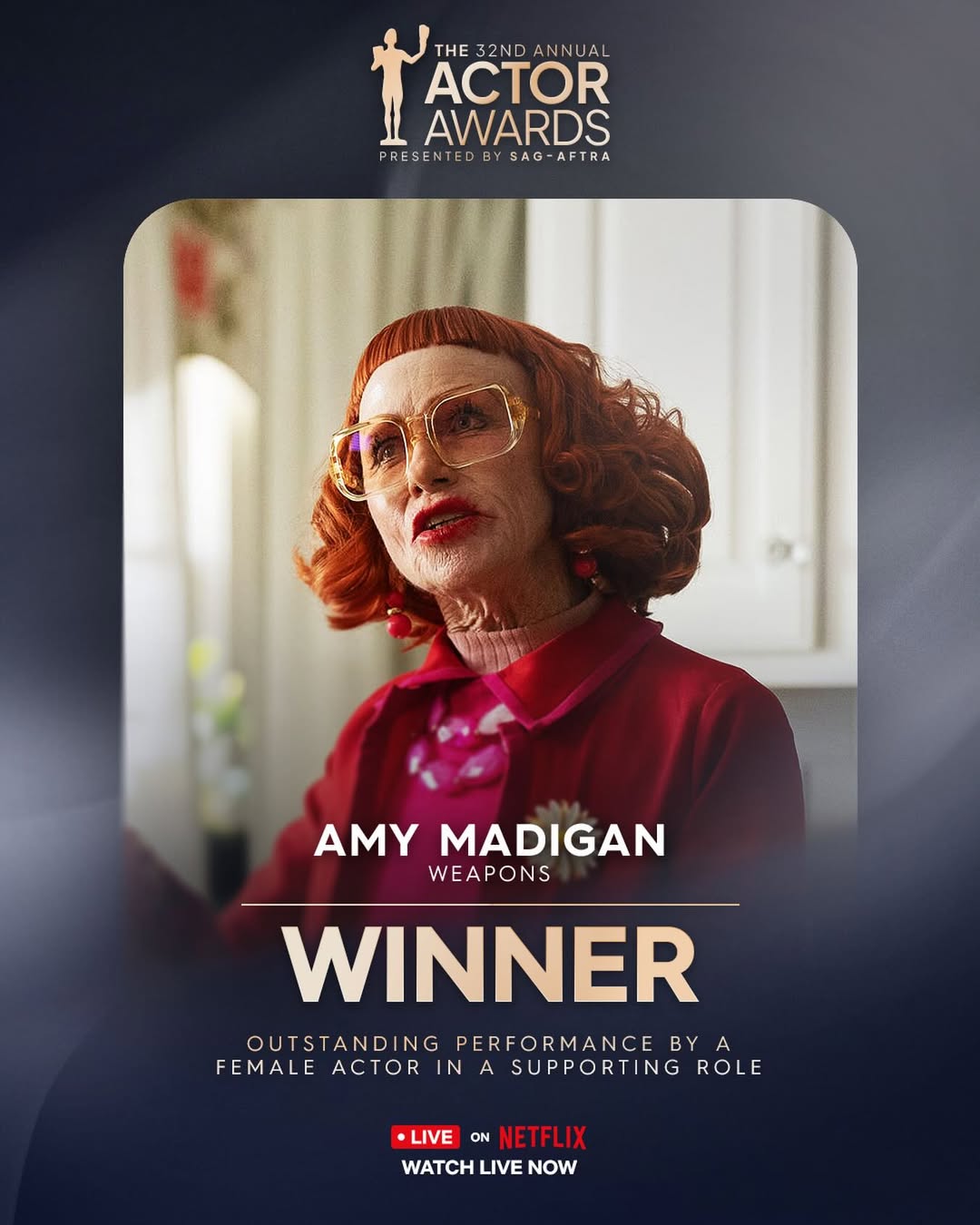
One of the biggest headlines out of last night’s Actor Awards (formerly known as the SAG Awards) was Amy Madigan winning best supporting actress for her work in Zach Cregger’s hit horror comedy Weapons.
As she stepped on stage during the last major televised ceremony of the season — a crucial platform as Oscar voting continues through Thursday, March 5 — Madigan charmed her fellow actors and peers, shouting out fellow Weapons actors Julia Garner, Alden Ehrenreich, and Austin Abrams and remarking on how “actors love other actors.” In a moment where she would’ve been completely justified to simply relish in personal victory after working at her craft for 45 years, Madigan turned the spotlight on the collaborators who made her remarkable transformation as Aunt Gladys possible.
As she finds herself on the cusp of Oscar glory, Madigan is also on the cusp of breaking through the Academy of Motion Pictures Arts and Sciences’ historic bias against horror performances (remember Toni Collette in Hereditary and Florence Pugh in Midsommar?) But it’s that same bias that could keep the Field of Dreams actor from going all the way.
Last year, best actress frontrunner and The Substance star Demi Moore lost the Oscar to Mikey Madison in the best picture winner, Anora. Moore won major awards at the Critics Choice, Golden Globes, and Actor Awards, while Madison won at the BAFTAs and Spirit Awards. The Substance certainly tested Oscar voters more with its ultra-shocking body horror, but Madigan’s trajectory with Weapons hasn’t been too far off from Moore’s — she’s a veteran actor finally getting her dues for an out-there horror performance in an even more out-there film. You could argue Madigan has the most identifiable career narrative of the season, and she gave one hell of a memorable performance that instantly went viral.
She’s been here before; in a fitting full-circle moment, Madigan received her first and, to date, only other Oscar nomination exactly 40 years ago for 1985’s Twice in a Lifetime, an indie drama starring Gene Hackman, Ellen Burstyn, and Ann-Margret (Madigan was the sole nominee for that film). The Oscar-winning group that Madigan hopes to join come March 15 is comprised of Jodie Foster and Anthony Hopkins for The Silence of the Lambs, Kathy Bates for Misery, Fredric March for Dr. Jekyll and Mr. Hyde, and Ruth Gordon for Rosemary’s Baby. A small group, but mighty company for the lucky actor who joins it next.
Madigan’s trajectory has already been compared to Gordon and Rosemary’s Baby, and rightly so — Gordon won the supporting actress Oscar in 1969 on her second acting nomination, while box office hit Rosemary’s Baby was only nominated for one other award (best adapted screenplay). Weapons was an undeniable summer sleeper hit, grossing $269 million worldwide and earning a coveted nomination from the Producers Guild of America, yet Madigan was the only part of the film to be Oscar-nominated. Her two main competitors, which include BAFTA winner Wunmi Mosaku for Sinners and Golden Globe winner Teyana Taylor for One Battle After Another, have the benefit of being in best picture frontrunners with 16 and 13 nominations apiece. Those films also have top-of-the-line visibility from distributor Warner Bros. Pictures.
With the uncertain state of the supporting actress race so far, Madigan has history going both for and against her; the past six Actor Award winners for supporting actress, most recently Zoe Saldaña for Emilia Pérez and Da’Vine Joy Randolph for The Holdovers, all went on to win the Oscar. But those six actors were in films with multiple Oscar nominations, including best picture, and four of the six swept all the major precursors. Notably, the last time the Actor Awards mismatched with the Oscar supporting actress winner was in 2019, when Emily Blunt won for A Quiet Place (she wasn’t even nominated for the Oscar!)
As the sole rep of her film in a fractured category, Madigan has more odds stacked against her. One could also argue, though, that Madigan being the sole nominee of her film means all the campaigning has been able to strategically focus on getting her the win. Whether she prevails at the Oscars or not, she’s certainly had a blast on the campaign trail, enjoying the likes of Oscar winner Sally Field and Emmy winner Hannah Einbinder hosting Weapons screenings, tastemaker events, and Q&As over the past several months.
Madigan’s performance as Aunt Gladys has resonated with horror fans for skillfully playing the character’s terrifying turn from chatty neighbor to demonic hair-splitting killer, while the LGBTQ+ community has embraced her entire look and ethos. Aunt Gladys costumes could, predictably, be seen everywhere on Halloween, and she’s become an unstoppable inspiration for drag artists and performers. In a recent interview with Turner Classic Movies, Madigan even noted Bette Davis and What Ever Happened to Baby Jane? as a major inspiration for Aunt Gladys’ makeup and look.
Madigan told Rough Draft Atlanta in November, “I think in that realm – as someone who was bullied a lot as a kid – whenever you see characters like Gladys being proudly themselves and loud and open, there is something that resonates [with] the queer community and everybody, because that is what people want – the courage to be themselves.”
Madigan was in good company last night, with Sinners aiming to continue making history for horror cinema after its record-breaking 16 Oscar nominations. At the Actor Awards, Michael B. Jordan won best actor and the film’s ensemble took the top award, while Mosaku won best supporting actress at the BAFTAs. Jacob Elordi, who won best supporting actor at the Critics Choice Awards for Frankenstein, is nominated at the Oscars as well.
Not all these actors are odds-on favorites to win their respective categories, but 2025 horror performances have already broken through with Academy voters in the nomination stage. It wasn’t too long ago when millions of people watched Weapons in a crowded theater and discovered Madigan’s transformative talent for the first time, with some immediately writing her off from the Oscar race based on historical precedent. It’s only fitting that Aunt Gladys and the chameleon actor who brought her to life continue to prove us wrong.
a&e features
Taylor Tookes wants you to be your own beauty standard
This queer model wants her fans to be larger than life — even if they’re only 5’1”
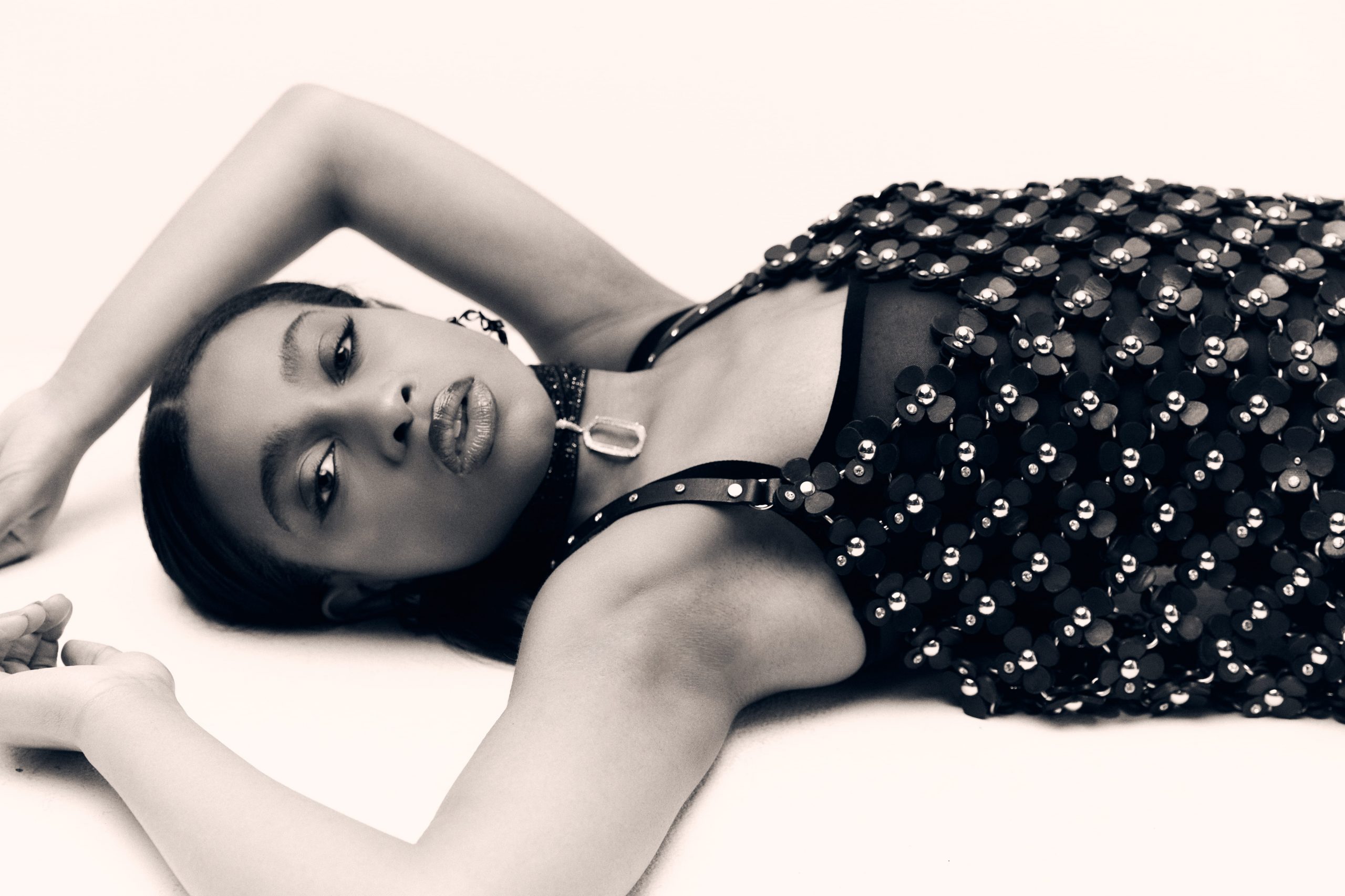
There’s a certain truth when it comes to the fashion industry: it’s absolutely brutal.
It’s undeniable how much fashion drives culture; from the clothes folks wear to the influencers taking over social media, this endlessly complex business determines so much of your average person’s day-to-day life. With this being such a gargantuan industry, it’s no wonder why it’s so difficult to be a successful model — especially if you’re marginalized! While recent years have seen a welcome increase in LGBTQ+ models, models of color, and models who don’t fall into your typical beauty standards, it’s still immensely difficult for someone who’s ‘different’ to make it in fashion today.
Which is what makes Taylor Tookes so unique.
Standing at a proud 5’1”, this queer woman of color has spent the past few years dominating fashion in a way most models could only dream of. From making history as the first “short” model in New York Fashion Week to recently being named Glamour Bulgaria’s Woman of the Year, her accolades haven’t stopped rolling in since she began modeling a decade ago. But despite this, she detailed how much rejection she still faces today, with so many people (in and outside of the industry) using her identities to discredit her many years of hard work. It’s a constant negativity that can easily get someone down, but for Tookes, she just has one thing to say: “I really don’t care.”
“What really made me want to pursue [modeling] as a career was rejection, and hearing the word ‘no’ a lot,” Taylor explained. “I thought it was the dumbest thing ever!” She detailed the countless rejection letters she received early in her career, with a majority of them blaming their dismissal on the model’s height. “There’s a side of [this] industry that embraces all of my identities, but there’s also that side that’s like, ‘You shouldn’t be here. Why are you here? You’re too short. You’re too this. You’re too that!’” These questions are ones that Taylor has heard from the first few days of her career up until now, with many still questioning her role even after appearing in numerous legendary magazines. But Tookes doesn’t let this negativity get her down! She is constantly optimistic and embraces a positive outlook…one that anyone who’s been online has seen before.
Since childhood, most people who’ve consumed any aspect of American media have encountered the mantra of ‘’You’re beautiful just the way you are.” It’s an uplifting message that can be indescribably hard to follow; it’s easy to say “love yourself no matter what” when you aren’t bombarded by oppressive beauty standards or the stress of a 9-5 job. Even more, for queer people, it can be so difficult to focus on how amazing you think you are when there are so many others trying to convince you otherwise. Because of this, our communities have been at the forefront of calling out ‘toxic positivity’ and its unhealthy effects on influencers who haven’t known strife, chiding others for not being as effortlessly confident as they are.
With Taylor’s nonstop ambition and optimism, it can be easy for people to dismiss her mentality as this distinctly cheery brand of unrealistic. But anyone who actually speaks with the model understands that this confidence didn’t come easy — it’s one she’s fought to have in spite of the countless people who told her she shouldn’t.
Throughout the conversation, Taylor spoke about the many years when any one of her identities excluded her from the spaces that taller, straight models could access easily. Yet she described these moments not with sadness, but with verve. “It doesn’t really affect me in any negative way. I would say it falls under the ballpark of rejection for me, which just pushes me to keep going.” She is not someone who had this career handed to her. Taylor has proven herself as a hard-working person who faces adversity every day online, but recognizes that it all comes from people who don’t matter because they aren’t her.
“You kind of just have to remove your perception of yourself from other people’s perception of you…because really, the only perception that matters is your own. What you think of you is the only [opinion] that matters.” It’s a mantra that would sound hollow from a person who hadn’t faced hardship before, but that gains power coming from Taylor. But she knows that this hard-fought mentality isn’t easy for everyone to, which is why she fights for her communities both on and off the runway. “Representation is really important [to me]….to see someone like yourself in the industry out there like you. So you can have the mentality of, ‘Hey, if they can do it, I can do it too.’” Along with breaking barriers, recent years have seen Tookes begin advocating for fresh faces in not only fashion, but media as a whole. She and fellow model Victoria Pousada recently began The Starter’s Block, an organization dedicated to amplifying indie projects and helping independent talent like they once were to find their place in the film industry.
As the conversation came to an end, Taylor Tookes emphasized that she may be one of the first short, queer women of color to conquer fashion — but she won’t be the last. She urged anyone with her identities to join her on the covers of magazines, to be brave and try while remembering that rejection is just fuel in the fight to follow your dream. And for those who may not want to walk a runway but just want to feel beautiful in a world constantly telling them they’re not, Taylor advises them to say what she tells herself whenever she feels down.
“I just remind myself: Don’t listen to them. You’re that girl…I remind myself of who I am, why I’m here, and what my mission is. [I just need] my own validation — and no one else’s. It all depends on me.”
a&e features
Revry Co-Founder Damian Pelliccione on why we need ‘King of Drag’
The co-creator of this hit series speaks about its impact — and what fans can expect from season two!
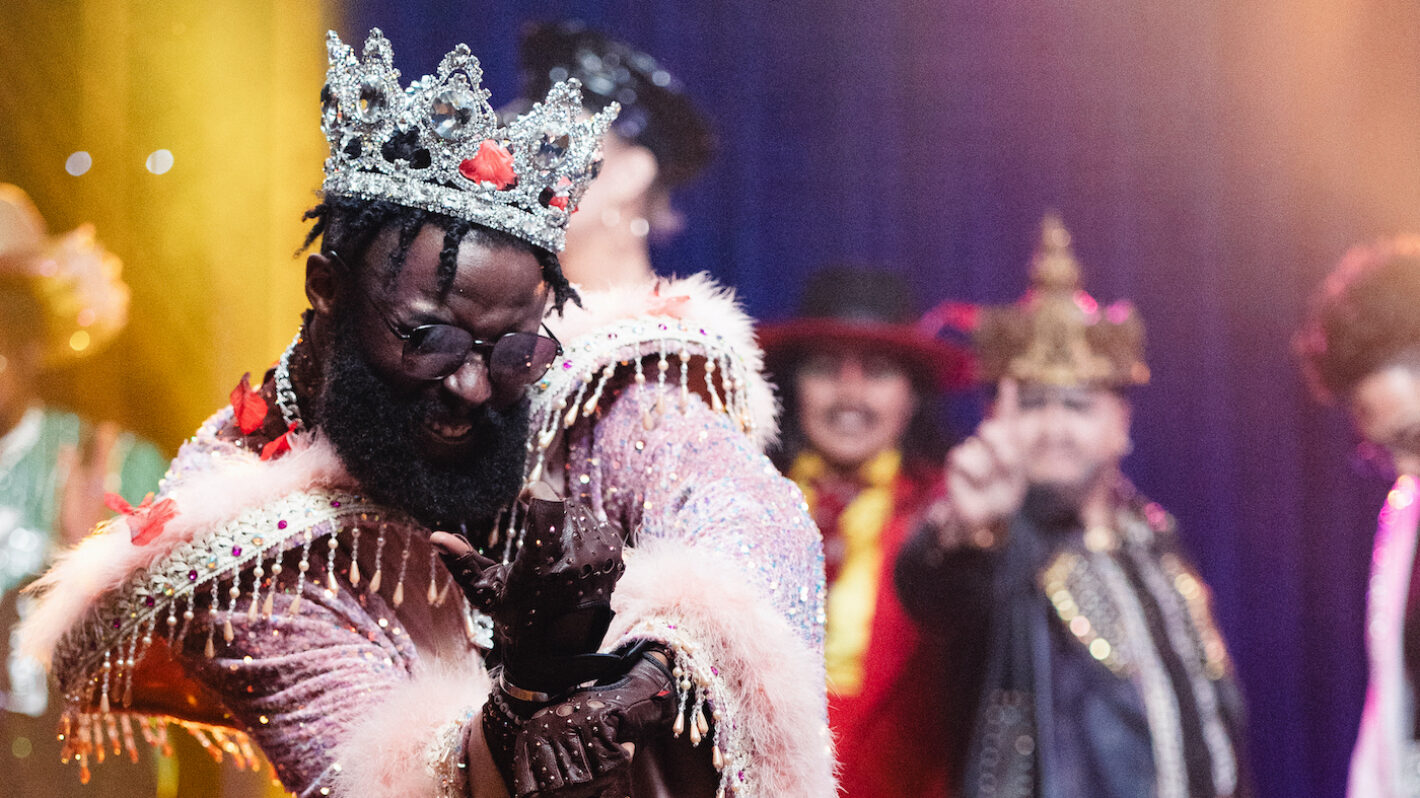
King of Drag, the only drag king competition show on TV, activated the LGBTQ+ community with a big bang, and it’s clear why. Despite an increase in drag-centric media, this was the first series deliberately focusing on spotlighting these kinds of artists. Even a year after its premiere, fans are still raving about the show, with season one delivering a level of kingly charisma nobody could’ve expected — making it all the more exciting when it was announced that King of Drag was officially casting for season two!
As co-founder of Revry — the LGBTQ+ streaming service that hosts King of Drag — and co-creator of this hit competition show, Damian Pelliccione understands the power that media has on its audiences. It’s why they work every day to create LGBTQ+ content anyone can enjoy, and it’s why they fought to get King of Drag televised and ensure it was a space where kings could finally be celebrated. Sitting down with the Los Angeles Blade to discuss the series’ season two announcement and what it’s meant to be a part of such a trailblazing franchise, they started this interview by making one thing very clear: “We’ve always been fully invested in casting and promoting Drag Kings on our shows.”
The co-founder spoke about how representing marginalized identities has always been an integral part of Revry’s mission. “We’ve always been very inclusive in our casting to make sure that we [work with] kings just as much as we work with Queens.” It’s a sentiment that, unfortunately, most other drag-centric series don’t share. RuPaul’s Drag Race, especially, has been criticized for refusing to cast anyone who wouldn’t fall under the umbrella of ‘queen.’ And while subversive programs like The Boulet Brothers’ Dragula do allow drag kings to compete, the show typically only allows one or two each season, meaning that there’s only a short time to discuss the boundless intricacies that exist in this art form.
This means that while drag king representation exists, it’s only been a trickle amidst the wave of awareness that drag queens have received in recent years. This phenomenon never sat right with Damian and their Revry team — so they decided to do something about it.
After years of searching for sponsors to get the show made, King of Drag officially premiered in June 2025 to widespread acclaim. Fans were instantly taken by the bombastic competition; while its format is similar to many other series’, the hilarious judging panel (led by the amazing Murray Hill) and jaw-dropping challenges were endlessly zany while also perfect avenues for contestants to show their immense talent. Almost growing emotional, Pelliccione recounted the widespread support the series received after its first few episodes, saying, “[Viewers] come forward to say, ‘Thank you for creating something that is not just about fighting or cattiness.’ It’s an elimination show, but you could see the authenticity in the heart of these kings…you could see their struggles, and [what it took] to create their art.” They fondly described the love this project hasn’t stopped receiving since it first came out — but they also detailed the rampant hatred that has come along with it.
It shouldn’t be forgotten that King of Drag was produced and aired early into the current presidential term, with the early months of 2025 seeing a level of anti-trans and homophobic rhetoric filling the U.S. in a way many viewers had never seen before. Damian recalled how, in the face of this hatred, their team understood that audiences needed King of Drag now more than ever. “It’s somewhat an act of defiance having a show like King of Drag — and having a network like Revry [altogether],” they said, filled with pride. “You can’t stop progress, and we’ve already come so far as a society (at least, I hope we have), so going back does not seem realistic. And I think that we’re seeing resistance now to our sitting government, and hopefully this carries into our midterm elections!”
A resistance that was buoyed by King of Drag, with each episode introducing viewers to nonstop drag excellence and thoughtful conversations on what it means to be a queer artist today. This, combined with the wild challenges — ranging from queer quiz shows to boy band performances — turned the initial installment into a raucously prideful experience for everyone watching. For almost a year now, fans have applauded all that the show was able to accomplish, and Damian assures these viewers that there’s even more coming in season two.
“Some of the biggest things we’re really excited about in this season are [not only] a few returning challenges, but we are [also] really bringing on a whole new level of celebrity guest judges,” raved the excited co-creator. “We’re really tailoring our [judges] so that they could be a kind of mentor or advisor. [Helping] build something that the king can use for their future career!” It was this point especially that Damian emphasized as the heart of King of Drag, recognizing that while having your time in the spotlight is amazing, bills still need to be paid when the cameras are shut off. “I want kings who come off our show booked and blessed. What else can we do as a network just to help support those careers?’”
With the interview coming to an end, Damian was asked the question that thousands of drag kings are currently thinking: how can I get cast? Typically, producers answer this style of inquiry with vague advice about uniqueness and skill — but not Damian. Still wanting only the best for their contestants, they plainly stated, “My one word of advice: this is not a side hustle.”
“The purpose of being on the show is to create a career for you…We want people who are really serious about the art form and have their own specific take on what it is to be a drag king. We want your authenticity, and we want to see that this is a career path for you. We [want to know] that this is something that you’re ready to take to the next level.”
An ambitious yet thoroughly uplifting goal for the many kings currently getting their applications together. And with that advice, the creator made one thing very clear: King of Drag exists not only to spotlight drag kings, but to bring them and their art form to the forefront of queer entertainment. It’s a revolutionary undertaking that viewers can watch unfold in each scene, and if a drag king feels ready to join in and become a part of this mission, Damian invites them to gather up their best drag and apply for season two today.
King of Drag season 1 is streaming on Revry
a&e features
‘Pee-wee as Himself’ and ‘Lurker’ directors on how queer audiences have reacted to their Spirit Award-winning films
“It’s been revelatory for young people,” Matt Wolf said of telling Paul Reubens’ coming out story

This year’s Film Independent Spirit Awards winners told wide-ranging stories of everything from Paul Reubens’ posthumous coming out in Pee-wee as Himself to a fictional homoerotic relationship that forms between an artist and his biggest fan in Lurker.
With such a diverse group of winners, these filmmakers reflected on how queer people and young audiences have responded to their work.
“I’ve talked to people whose kids have seen the film, and young kids don’t understand what the closet is,” Pee-wee as Himself director Matt Wolf told The Blade backstage. “As a younger, gay filmmaker, I felt like I could help him do that on his own terms. It was a big deal for Paul. It’s interesting to hear from people’s kids who don’t understand the struggle.”
Wolf continued: “It’s been revelatory for young people in that sense, but also I’m hearing from people that their kids are now watching Pee-wee’s Playhouse, and that they love it. And you never know, does this thing look old? Does it feel outdated? [His films are] so otherworldly, and I don’t think young people register it as being from any time.”
Lurker director Alex Russell (who previously wrote on Beef and The Bear) nabbed awards for best first screenplay and best first feature, and Théodore Pellerin and Archie Madekwe were nominated for their performances. Russell’s win is a testament to Film Independent’s legacy of embracing new generations of filmmakers and storytellers.
While accepting the award for best first screenplay, Russell recognized the creatives who took a chance on him, saying: “I want to thank everyone who was willing to look stupid and put even just a sliver of themselves on the line to legitimize all these new filmmakers here tonight, who, without you, would still be aspiring to make their first movie.”
Backstage, The Blade asked the breakthrough filmmaker about how queer people have responded to the film’s thorny take on male relationships.
“I don’t know if the queer community has reacted to me personally. There’s an interesting discussion in what Matthew and Olivier’s relationship is all about … and where they stand on the spectrum,” Russell said. “I want people to think about that, I want people to think about the ambiguity of that. That being said, if the queer community wants to talk to me about it, I’m here!”
Pee-wee as Himself is available to stream on HBO Max, while Lurker is on MUBI.
a&e features
Liveplay series ‘Gladlands’ finds hope in the unlikeliest of places
The cast of ‘Dimension 20’s’ latest season discusses bringing chaos and community to their many loyal fans.
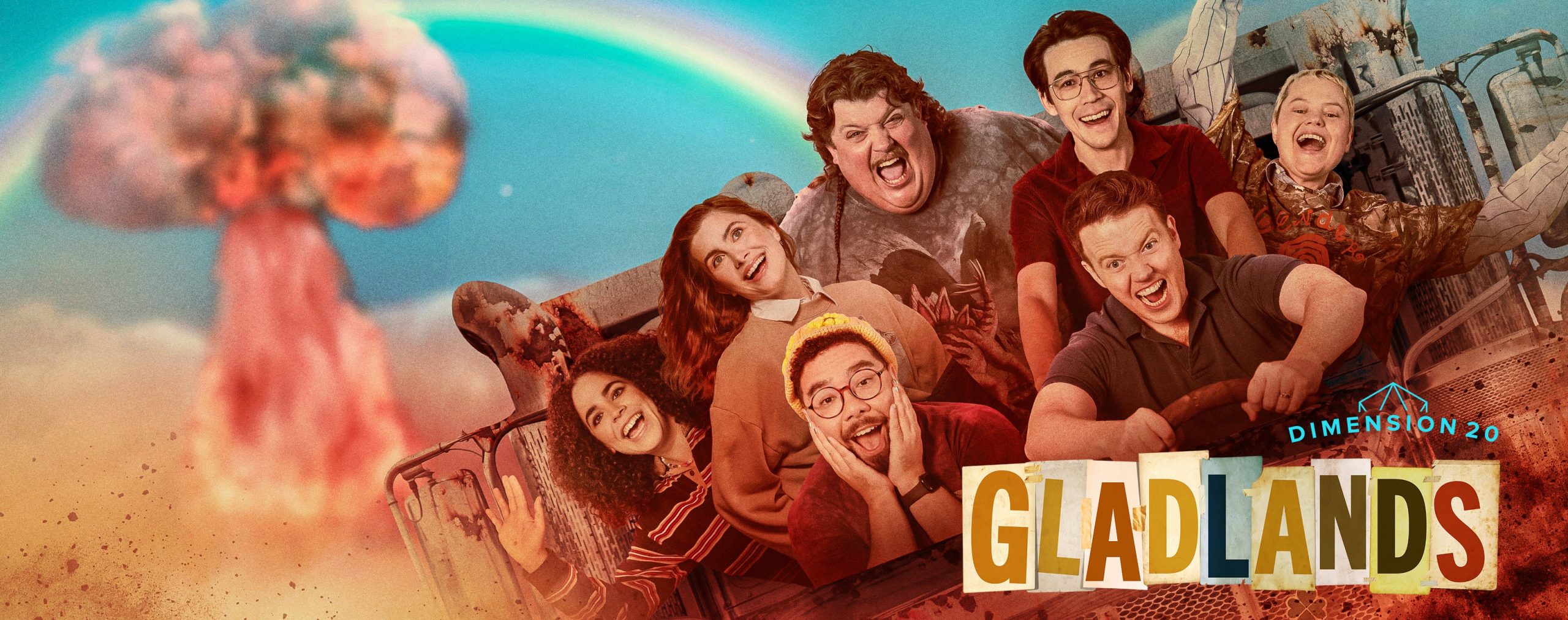
Sometimes, it takes everything falling apart for us to remember that community is what holds us together.
It’s a lesson that many people have learned in recent months. Amidst the ongoing attacks against LGBTQ+ and immigrant populations, folks across the country have come to realize just how important community is to each of our daily lives.
Now more than ever, marginalized communities need to remember that oppressors have always used grief to further disenfranchise the people they’re attacking. And that, as laughable as it seems at times, the best response to others’ hatred is to love one another; to foster strength and joy amongst our own groups to ensure we have the fortitude necessary in the ongoing fight against bigotry. Many projects have tried to remind folks of this message…and one just so happens to be a tabletop roleplaying game (TTRPG) set in a post-apocalyptic — and so, so queer — wasteland.
Gladlands is the latest season of Dimension 20, a renowned TTRPG liveplay series that sees groups of LA-based performers tackle some chaotic new narrative every season. The show’s newest installment takes place in a barren wasteland, with all cities and symbols of civilization reduced to rubble after a multi-year ecological crisis (which just so happens to resemble the one we’re currently fighting right now). The cast, which features a majority LGBTQ+ group of LA-based comedians, plays a team of folks trying to help as many people in this hellscape as possible, reminding every survivor they come across that it’s easiest to get through the hard times when we’re in them together.
The cast of Gladlands sat down with the LA Blade to discuss this poignant message and how it feels to deliver it when folks need it most. They speak about their roles in the series, their personal lives as local artists in Los Angeles, and how it’s fun pieces of media like this that can get folks through the toughest times. They raved about this complex project and what they hope it will bring to everyone who watches, with each player emphasizing Gladlands’ core message: you are not alone.
As strange as it may seem to people not in the community, it’s not uncommon for role-playing games like Gladlands to touch on issues real people struggle with every day. “It really is transformative,” said Oscar Montoya, who plays the fierce Drag Queen librarian ‘Poppy Persona’ on the season. “There’s a little bit of your soul that goes into every character that you play…and there’s so much self-realization that comes when you play TTRPG that you [may not] even recognize!” It’s a sentiment that fellow player Kimia Behpoornia, who plays the skateboarding cockroach-human hybrid ‘Tess Tube5,’ echoed, stating, “[These games] help people feel so validated.”
The cast reiterated how it’s these sessions of fantasy that often allow people to grow in very real ways. That’s why they believed it was the perfect platform to spread the message of love threaded throughout Gladlands, a season that sees their group of apocalyptic advocates — members of the legendary ‘Carer-Van’ — drive across an endless desert in search of anyone who needs help. An eclectic group of humans and mutants, each episode sees them work hard to see the good in their fellow person and flex their many skills to assist those in need.
“It’s really nice that this season is here [during a time] when it really resonates,” Kimia went on. “But it’s kind of the simplest idea [ever] to want to help your community!” Vic Michaelis, whose plague mask-wearing character ‘Hugi’ is the apocalypse’s only mortician, stressed that the show’s message is one that everyone needs to remember right now. “We’re living during a time [when] community is very important…but there’s no way [when we were filming] that we would’ve known the season would come out at a time like this. But [we are] watching people dig down right now and go, ‘We are taking care of our community.’” They reminded everyone watching that this kind of communal care is not only inspiring, but also threatening, saying, “That strikes fear amongst people in power. There is success in coming together to protect your community, [which I think] reflects the themes of Gladlands.”
“Trying to stay glad is, in itself, a form of resistance,” Agreed Jacob Wysocki, who portrays the warm and cuddly caretaker KoKoMo. He detailed how, through their characters, each player hoped to offer viewers models of the many behaviors that allow real communities to flourish. On that in particular, he gave credit to the season’s dungeon master, Brennan Lee Mulligan, saying, “He built this world because he looked at the [real] world we’re in and [asked], ‘Does it take a fully post-apocalyptic world to get to a space where community [comes] first?’”
“Baby — we live in the post-apocalyptic times right now!” Said Montoya, whose time as a Los Angeles activist has given him special insight into how this city’s communities have been struggling. “[But] I think the important thing to realize is that we create our own Gladlands…the message of community coming together to combat adversity is so paramount, especially right now. To have a collection of people you can lean on and say, ‘We don’t like this. We don’t stand for this. Let’s create something together.”
Each cast member agreed that, while a lovely sentiment, the messages broadcast through their show are easier said than done. But they each emphasized that you don’t need to be part of a roving band of super-powered caretakers to do good — and that no matter what, this kind of work should never be done in solitude. “[Remember] you’re not in it alone,” emphasized Montoya, as the interviews came to an end. “You are a part of a community that can enact change. And know: they’re trying to take that away from us. They’re trying to make us feel smaller and less than. [But] you have to recognize that we have the power…especially when it feels so overwhelming. Because it is then that you have people who have your back, who will continue to have your back [no matter what].”
An uplifting message of community, wrapped up in a chaotic season of jaw-dropping dice rolls and truly wild character arcs. Gladlands showcases that, sometimes, the most important lessons come in the most surprising packages. And, with each of these performers at the helm, it highlights the core message of this series as a whole: you’re never alone in the fight for community. And true freedom starts with being there for your neighbors, making sure that you all have what you need for whatever may come next.
a&e features
Tello Films: Celebrating 19 years of lesbian storytelling
Tello Films proves that, after 19 years, independent lesbian filmmaking is as necessary as ever.
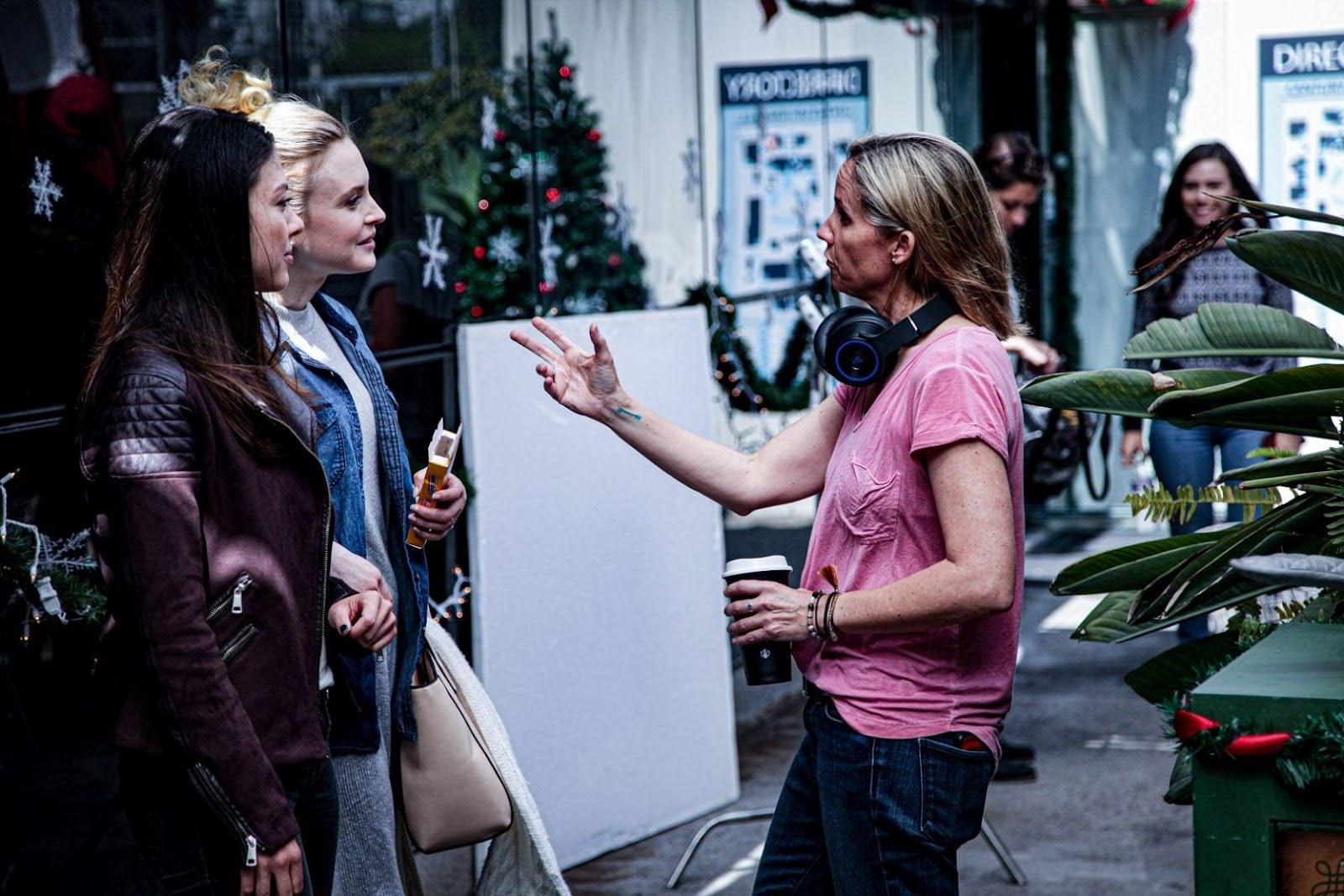
In an era where LGBTQ representation in movies has hit a three-year low, Tello Films proves that, after 19 years, independent lesbian filmmaking is as necessary as ever. According to Sarah Kate Ellis, the CEO and President of GLAAD, “Nearly ⅓ of non-LGBTQ Americans say that LGBTQ inclusive films have changed their perception of our community… It is imperative that networks and streamers do not back down.”
Meanwhile, the lesbian streaming service Tello Films celebrated its 19th birthday on February 6th. Says founder Christin Baker, “When I started it 19 years ago, I thought at some point maybe we wouldn’t be necessary, […] I really do feel like representation saves lives…it’s still important for us to be around.” Often referred to as the “Lesbian Netflix”, the Nashville-based production company has a primary focus on lesbian and sapphic stories for the past 19 years and thankfully, is just getting started.
Tello Films was far ahead of its time. For those of you who didn’t live through or don’t remember, 2007 was a different time. Apple debuted the first iPhone, Barack Obama declared his run for the presidency, and the phrase “that’s so gay!” was prevalent as ever (at least at my high school). “We didn’t have marriage equality at that time. Civil unions were kind of starting here and there -the crazy thing (is that) ‘Don’t Ask Don’t Tell’ was still in effect.” Baker recalls, “There were still so many rights we didn’t have in 2007 when we started it, and we are still fighting for it.”
Tello Films’ beginnings were just the start of the lesbian legacy. Said Christin, “I never thought Tello would or could ever be my full-time job.” With the URL TelloFilms.com registered on February 6, 2007, the platform was an internet-based streaming company with all its movies formatted small to appease a 2007-era browser. While Netflix was only just beginning to offer streaming services, launching any streaming service in 2007 was bold; to launch a streaming service entirely devoted to lesbian and sapphic stories was revolutionary. “I want to make lesbian stories.. I want to see things that represent me.”
In the past 19 years, Baker shares her career-defining moment came from the recently deceased Nancylee Myatt, showrunner for South of Nowhere. “We made a short-form series called Cowgirl Up. I felt like I put my big girl pants on. Nancylee was a huge mentor, and I was like, ‘Oh, I can do this. I can do this, and I can figure it out.’”
Tello went on to receive their first primetime Emmy nomination with Mindy Sterling of Austin Powers fame for Outstanding Actress in a Short Form Comedy or Drama Series. “We got two daytime Emmy nominations for two actresses, Liz Vassey and Carolyn Radere […], then in 2018 we made our first lesbian Christmas movie,, Season of Love and that really kind of started us down the path, and I think we’re probably most well known for, which is our lesbian holiday rom-coms.”
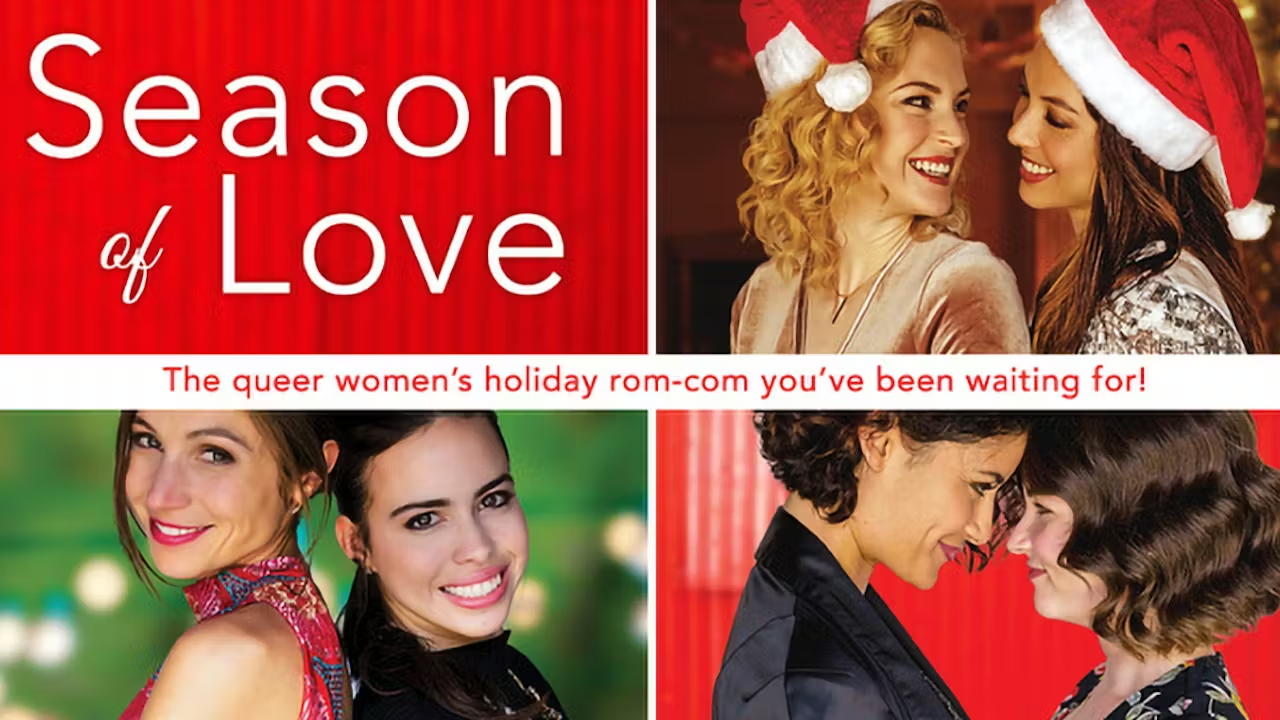
We now live in the era of Chappell Roan, Doechii, Heated Rivalry, and so many more queer artists and pieces of media in the mainstream’s consciousness. The last several years in pop culture have proven that queer art and artists matter, not just as a salve to a society that still struggles to accept us, but to the mass audiences who continue to resonate with it.
Queer media is being devoured by folks outside of the LGBTQ community. “I think it (Heated Rivalry) shocked so many people (because) it was powerful and compelling […] I wasn’t that surprised because I remember Brokeback Mountain being very much in that same vein; it was just cowboys instead of hockey players.” Authenticity and overcoming adversity are not just tenets of good storytelling; they are also ever-present themes within the lives of any queer you know.
As Christin sees it, the success of Heated Rivalry isn’t just rooted in its unabashed sexual themes, it has a very universal “lesbian” approach to its storytelling “There’s a ton of longing, and missing, and having a crush and not knowing if it’s reciprocated, […] there’s a lot that you tap into just on a human level that Heated Rivalry really touched on.”
Themes that are at the forefront of the sapphic stories Tello has mastered telling. “We still don’t have enough LGBTQ holiday Christmas movies out there each year. Some people wouldn’t look at a Hallmark movie or Christmas rom-com as substantive, but I really do feel like representation saves lives.”
For so many in the LGBTQ community, representation isn’t theoretical- it’s personal. I know for myself, in the throes of a messy divorce, one of the only things that brought me comfort was the sapphic films on Tello. It was so difficult to find lighthearted queer stories. I recall searching through every streaming service as they were slowly but surely eliminating the LGBTQ sections from their apps, as well as those queer characters and shows. But not Tello; I was able to find comfort and ease through a tough time in my personal life. “It’s such comfort, especially if you’ve gone through something that’s tough and your regular daily life is stressful, you need an escape to something that you know is not going to cause more anxiety.”
Having accessible ways to both tell and consume sapphic stories is tantamount to this moment in time. Independent filmmaking has the power to make sure authentic stories are heard. Being an independent voice as well as being able to support smaller budget stories that definitely wouldn’t get picked up, or even recognized or seen in mainstream, Christin and Tello Films are uplifting not just lesbian and sapphic stories, but lesbian and sapphic artists as well.
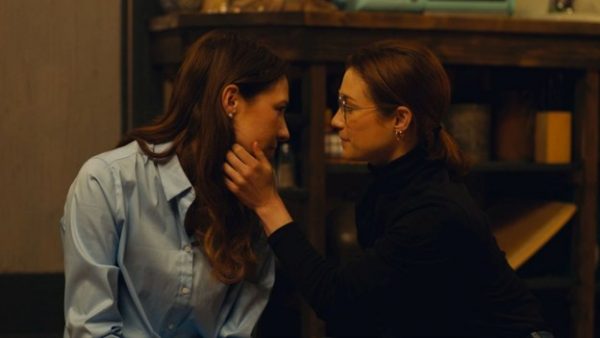
As for the future of lesbian filmmaking, it’s no secret that Hollywood is drowning, leaving a void for people like Christin and Tello Films to fill. Said Baker in light of the shrinkage in Hollywood and what that means for Tello Films, “We will get even more creative and tell even more stories, because we can’t be stopped.”
Encouraged by her fiancée, Stacey Lee Powell, Christin wants the world to know that Tello Films isn’t just a business, it’s personal. “I see Tello as an extension of me.” Says Baker, “In doing that, I hope that people see that Tello isn’t some corporate entity, I hope they see that it is someone who cares deeply. I’ve been doing this for 19 years, and every day I wake up trying to figure out how to tell our stories and how to serve our community.” Nineteen years later, Tello Films remains what it has always been: not a nameless, faceless corporation, but an extension of a storyteller’s dream to build a safe space for her community.
Check out TelloFilms.com
a&e features
From ‘So Random’ to sexy theater: LA’s very own Mathew Scott Montgomery
This former Disney star breaks down their new play, ‘Foursome,’ and the security of performance.
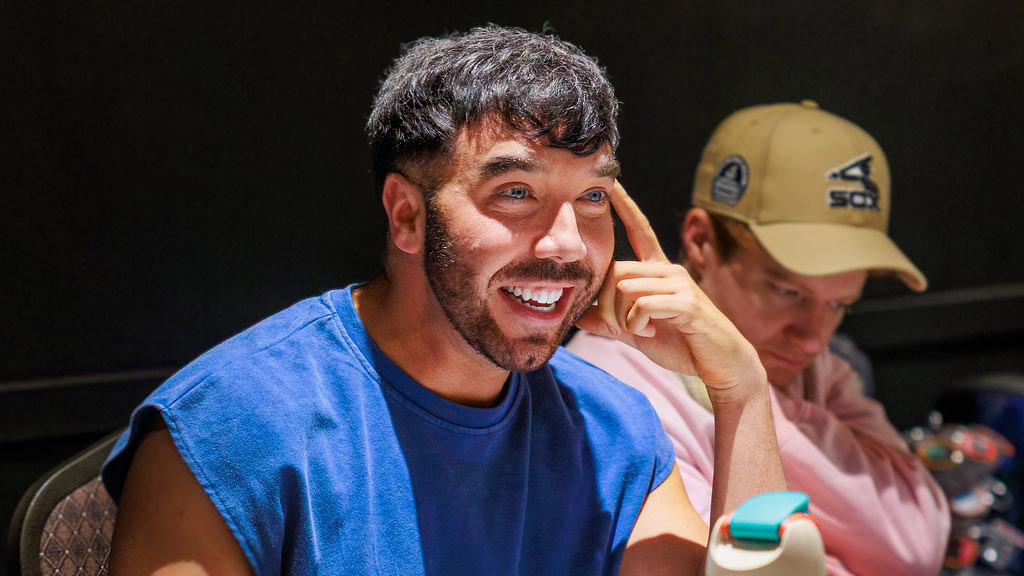
Even in a Los Angeles filled with experimental theater, few projects have been as brazenly sexual as the IAMA and Celebration’s Foursome. Following a quartet of queer friends as they embark on a weekend getaway, this play watches as they uncover the secrets (and attractions) that have always lurked in the shadows of their longtime friendships. Filled with niche community references, heartfelt vulnerability, and some of the spiciest live sex scenes audiences will ever see, Foursome is proving itself as an innovative look into queer sexuality — and none of it would have been possible without The Disney Channel.
Matthew Scott Montgomery began his career on Disney with one goal: pull focus. He quickly found out that he was a tad too good at this; in his conversation with the LA Blade, he detailed the many times his early onscreen performances were cut down because he was considered ‘too distracting.’ From starring as an extra in Zendaya’s Shake It Up to leading the SNL-style So Random!, his childhood career saw Montgomery flexing the bombastic personality he still carries today. And while the goal of this interview was to speak with the performer about Foursome and his time with Disney, the first few minutes were spent discussing an equally important portion of the man’s life: the Hilary Duff concert he’d seen at The Wiltern the night before.
“[I’d] spent all day in rehearsals with three of the best queer actors in the world, and [then I left] to go to a Hilary Duff concert in LA with my boyfriend, as a gift from [Demi Lovato],” raved Matthew. “I burst into tears because it hit me: none of this would’ve happened if I hadn’t come out…I wish I could go back to ten-year-old me back in North Carolina and [tell him], ‘One day, you’re going to leave your gay play rehearsal, [meet up] with your boyfriend, and go to a Hilary Duff concert. And everything is going to be okay.”
Matthew remembered this little kid from a conservative hometown who dreamt of nothing more than boyfriends and Lizzie Maguire in concert. He explained that his area of North Carolina didn’t allow for any level of dramatics from young boys — something that definitely didn’t mesh with this gay child who felt safest when he was onstage.
“When I was a kid, I used to record episodes of Will and Grace [on the VCR], write down the dialogue, then go into my room and run the scenes [when everyone was asleep]…I’ve always identified as an artist, and I was desperate to perform,” said Matthew, reminiscing on his early days as an artist. “I think the safest place in the world is on stage or in front of a camera, because you know exactly what you’re going to say. You know what your lines are, which mark you’re gonna hit…everyone is watching you, and you’re being perceived, and it feels so safe. I get nervous off camera, because then you don’t have a map of what’s happening.”
Performance has always served as both a passion and a safety for the actor, with Montgomery laughing at the many years he spent acting out his favorite shows in the sanctity of his childhood bedroom. Luckily, he eventually took these skills to a giant stage most kids could only dream of: The Disney Channel.
After years of hearing the terrible experiences of so many child actors, it’s heartening to learn how validating Montgomery’s early time on TV was. He told stories of Disney gigs and fun hangouts with queer stars like Haley Kiyoko and Demi Lovato, people who he still considers close friends today. “We would talk about our queerness and how to navigate it,” he said, showing love to the tight-knit network that these closeted children created for one another. It was because of their support that he had the courage to come out in his early 20s, with this new self-acceptance allowing Matthew to take on openly queer projects and even begin writing his own — cue Foursome, his latest creation and certainly the sexiest one yet.
Foursome sees the actor as Noah, a young man whose weekend at a cabin with three friends turns into a night of revelry as loosened inhibitions lead to shocking confessions. On why he created a project centered on modern sexuality, he explained, “I think there’s a really beautiful thing about the queer community where we can love each other through different evolutions of our friendships…this play is really about celebrating that freeness, and having a very frank discussion about what it means to be a queer person in a relationship in the modern day.”
The project douses this exploration into contemporary sexuality with so much pop symbolism that it’ll be relatable for any LGBTQ+ person watching. From the pop songs our main cast sing to the community-based slang they throw at one another, the writer wanted to instantly clue queer watchers into the fact that this was made for them by one of their own. And it’s that, he stressed, that is the goal of not only Foursome, but his entire career: making other people feel seen.
“What’s most important to me is queer joy,” Matthew stated, as the conversation came to an end. “Showing queer people having a good time…I think that can be a radical thing, especially with the way the world is right now. We’re going to be gay, and we’re going to be fun, and [our goal] is to have you join us in that fun.” He promises that Foursome will be a summation of his decades-long career of making people laugh, combining his uniquely gut-busting brand of humor with an earnest discussion around how our communities form relationships outside of heteronormative ideals. He invites everyone to come see Foursome and, in its nonstop joy, hopes that by creating this kind of inclusive art piece for viewers, he’ll be imparting onto them some of the security he’s always felt onstage.
And when asked if he had any final enticements for potential watchers, Montgomery adorned the smile that he’s worn since his Disney days and stated, “Well, we do say that the title, Foursome, is a promise — and we absolutely deliver.”
Foursome will have its world premiere with IAMA Theatre Company, produced in association with Celebration Theatre. Performances are at the Atwater Village Theatre, 3269 Casitas Avenue, Los Angeles, and plays now through March 23. Tickets ($30-$45) are available at iamatheatre.com
a&e features
Angel McCoughtry, “Renaissance Woman”
Angel McCoughtry is a professional athlete. A two-time gold medalist, 5-time WNBA all-star, philanthropist, and now filmmaker.

“Renaissance Woman” is a term fit for a queen. Heavy is the head that wears the crown, but we’re in luck because Angel McCoughtry is a professional athlete. A two-time gold medalist, 5-time WNBA all-star, philanthropist, and now filmmaker, Angel has built career(s) defined by reinvention and an insistence on excellence at every turn.
Her move to take charge behind the camera comes at a time that feels anything but divine. In a time where stories like Heated Rivalry bring the heat (pun intended) one moment, while nearly half of all queer characters and stories are vanishing from TV the next, McCoughtry’s leadership behind the camera signals something hopeful: A refusal to let anyone or any story get left behind.
A WNBA legend, McCoughtry played ten years without pause, splitting her time between the W and overseas leagues. In college, she led the Big East Conference in scoring, rebounds, and steals, obliterating records, even the ones she herself set. The number one draft pick and Rookie of the year in ‘09, McCoughtry quickly became one of the best players the W has ever seen. Though she never officially retired, Angel hasn’t played in the W since 2022, when she was sidelined for an injury that she has since healed. (Ya hear that WNBA? Our girl is ready to come back!)
Being forced to step away from the game brought about a reckoning that is all too familiar to elite athletes everywhere: “Who are you when your body won’t let you perform?” Through detangling this identity crisis, McCoughtry found a new appreciation for storytelling, the stories we tell ourselves as well as the stories we tell the world. Angel’s innovative storytelling and directing style are inspired by basketball, as she likens herself to the Dawn Staley of film, adding, “When you allow your players to be free, they can play at their highest level, and that’s what I allow my actors to do.”
Inspired by her grandmother’s stories of playing ball in a time when women were not allowed to cross half court and had to wear skirts, Angel wants to empower resilient perspectives. “I can’t keep their stories hidden,” She says, “The women who paved the way.” Laser focused on bringing scripted sports films to the mainstream, McCoughtry says, “I’m looking for stories that resonate with the people, and I want to be the one to bridge the gap and bring women’s sports scripted content to the forefront.”
Through McCoughtry Entertainment, Angel wants to bring women’s sports to the forefront as well as genre-driven films, particularly sports-thrillers led by women. Her short film Bygones is now available to stream on Prime Video, with more projects in the barrel. Her feature-length directorial debut, Bolted, is on deck as her next project. I personally would love to see the gay women’s version of Heated Rivalry in McCoughtry’s hands, who says, “There’s a realness to it,” about the show, “That happens often, and it’s not talked about [..] that’s all over women’s sports.”
“I am obsessed with stories about overcoming adversity,” says McCoughtry, an apt throughline in Angel’s work that reflects the spirit of creativity and athleticism.
a&e features
Alexander Skarsgård describes ‘Pillion’ in 3 words: lube, sweat, leather
Highly anticipated film a refreshingly loving look at Dom-sub life
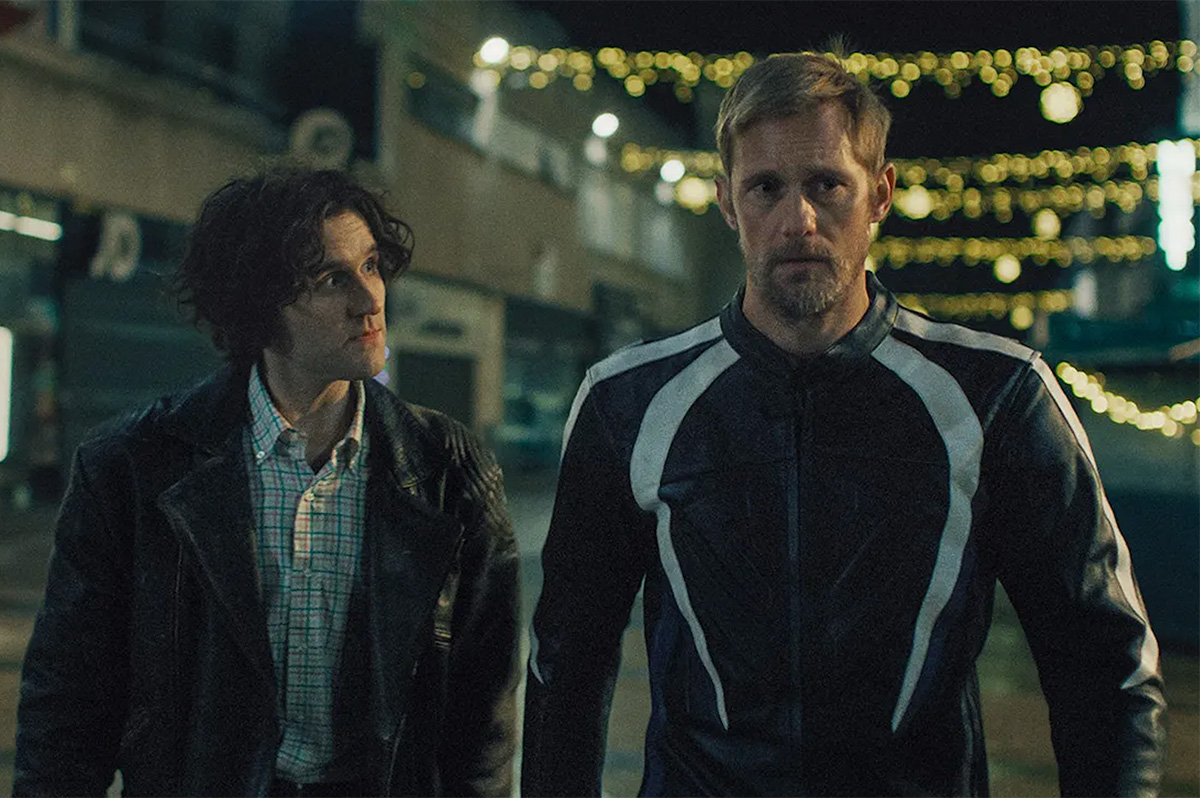
Whether you’ve seen him in popular HBO series like “True Blood,” “Succession,” and “Big Little Lies,” the dynamic Swedish actor Alexander Skarsgård has that smoldering gaze that immediately draws viewers in.
Following in the footsteps of his father Stellan, (who just won the Golden Globe for “Sentimental Value”) the Golden Globe, Emmy, and SAG winner Skarsgård continues to be an actor who is fearless in the roles he takes on.
That courageousness is evident in Skarsgård’s latest film, the BDSM black comedy “Pillion,”which he also executive produces. He plays Ray, the handsome, hyper-dominant leader of a gay bike gang. The film was written and directed by Harry Lighton, and is based on the 2020 novel “Box Hill,” by Adam Mars-Jones.
“This was a small film by a first time filmmaker and it wasn’t financed when I read it,” Skarsgård told journalists at a recent awards news conference. “And I felt that, if I could help in any small way of getting it financed, I wanted to, because I thought it was such an incredible screenplay and I believe in Harry Lighton so much as a filmmaker. And it felt tonally unlike anything I’d ever read. It was such an exciting, surprising read.”
Skarsgård was blown away by the quality of the unconventional script. “When I heard BDSM relationship, biker culture, I expected something very different. I didn’t expect it to have so much sweetness and tenderness and awkwardness.”
For the sex scenes and nudity with co-star, Harry Melling — who excels in his portrayal as Ray’s submissive Colin — Skarsgård talked very early on with Lighton about how he wanted to shoot those scenes, and why they were in the film.
“I often find sex scenes quite boring in movies because a lot of the tension is in the drama leading up to two people hooking up, or several people hooking up, as in our movie. But what I really enjoyed about these scenes — they are all pivotal moments in Colin’s journey and his development. It’s the first time he gets a blowjob. It’s the first time he has sex. It’s the first time he has an orgasm. And these are pivotal moments for him, so they mean a lot. And that made those scenes impactful and important.”
Skarsgård was happy that Lighton’s script didn’t have gratuitous scenes that shock for the sake of just shocking. “I really appreciated that because I find that when this subculture is portrayed, it’s often dangerous and crazy and wild and something like transgressive.”
He continued: “I really love that Harry wanted it to feel real. It can be sexy and intense, but also quite loving and sweet. And you can have an orgy in the woods, rub up against a Sunday roast with the family. And that kind of feels real.”
One of the obstacles Skarsgård had to work with was Ray’s emotionally distant personality.
“Ray is so enigmatic throughout the film and you obviously never find out anything about him, his past. He doesn’t reveal much. He doesn’t expose himself. And that was a challenge to try to make the character interesting, because that could easily feel quite flat…That was something that I thought quite a lot about in pre production…there are no big dramatic shifts in his arc.”
For the film, Lighton consulted the GMBCC, the UK’s largest LGBT+ biker club, attending their annual meetup at which 80 riders were present.
“Working with these guys was extraordinary and it brought so much texture and richness to the film to have them present,” said Skarsgård. “They were incredibly sweet and guiding with us — I can’t imagine making this movie without them. I’d go on a road trip with them anytime.”
Added Skarsgård: “To sum up ‘Pillion’ in three words: lube, sweat, and leather. I hope people will connect with Colin and his journey, and come to understand the nuance and complexity of his bond with Ray.”
This year is shaping up to be a busy one for Skarsgård. “Pillion” premieres in select cities on Feb. 6 and then moves into wide release on Feb. 20. After that for Skarsgård is a role in queer ally Charli XCX’s mockumentary, “The Moment,” which premieres at the Sundance Film Festival. HIs sci-fi comedy series, Apple TV’s “Murderbot,” which he also executive produces, will begin filming its second season. And this weekend, he hosts “Saturday Night Live.”
-

 a&e features2 days ago
a&e features2 days agoAmy Madigan finds herself on the cusp of Oscar glory. Can she overcome the historic bias against horror performances?
-

 a&e features5 days ago
a&e features5 days agoTaylor Tookes wants you to be your own beauty standard
-

 Television4 days ago
Television4 days agoSexy financial drama ‘Industry’ is feeding the queer community
-

 Commentary2 days ago
Commentary2 days agoLA28: Where is your moral compass?
-

 Books3 days ago
Books3 days agoLove or fear flying you’ll devour ‘Why Fly’
-

 California2 days ago
California2 days agoEquality California has sponsored 12 bills to advance LGBTQ+ rights in the state
-
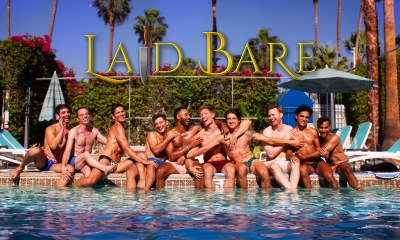
 Television15 hours ago
Television15 hours ago‘Laid Bare’ isn’t your typical sexy slasher
-
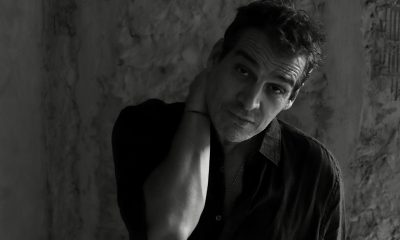
 a&e features21 minutes ago
a&e features21 minutes ago35 years after ‘Truth or Dare,’ Slam is still dancing





